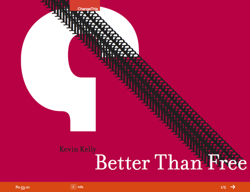Wired’s Kevin Kelly looks at the internet as a copy machine. That makes it a harbringer of change:
the previous round of wealth in this economy was built on selling precious copies, so the free flow of free copies tends to undermine the established order. If reproductions of our best efforts are free, how can we keep going? To put it simply, how does one make money selling free copies?
[Kelly]
Making money with free copies seems absurd. But it isn’t, because some things can’t be copied–such as trust. “When anyone buys a version of something they could get for free, what are they purchasing?” Kelly gives 8 answers:
- immediacy
- personalization
- interpretation
- authenticity
- accessibility
- embodiment
- patronage
- findability
These cannot be copied; they are ‘generative’:
In a real sense, these are eight things that are better than free. Eight uncopyable values. I call them “generatives.” A generative value is a quality or attribute that must be generated, grown, cultivated, nurtured. A generative thing cannot be copied, cloned, faked, replicated, counterfeited, or reproduced. It is generated uniquely, in place, over time. In the digital arena, generative qualities add value to free copies, and therefore are something that can be sold.
[Kelly, page 4 ChangeThis 53.01 PDF]
About advertising, Kelly remarks:
Careful readers will note one conspicuous absence so far. I have said nothing about advertising. Ads are widely regarded as the solution, almost the only solution, to the paradox of the free. Most of the suggested solutions I’ve seen for overcoming the free involve some measure of advertising. I think ads are only one of the paths that attention takes, and in the long-run, they will only be part of the new ways money is made selling the free.
[Kelly, page 9 ChangeThis 53.01 PDF]
Why I care
First, I’m fascinated by the evolution of publishing and how it relates to the communication of ideas. Kelly’s argument presents a rationale for free publishing. The interests of the players, the possibilities for commodification, and cheap distribution will drive the shifts ahead. ‘Free’ is one way for for readers, authors, and publishers to interact. Authors and musicians want an audience or, perhaps, compensation (depending on their needs); readers want content (or perhaps content of guaranteed quality); publishers want sales or, perhaps, wide distribution (depending on their for-profit-status and long-term goals). Whatever is ahead, it will be interesting to watch “the new ways money is made selling the free”.
Second, I recently read that “Google sees advertising as a form of information in and of itself.” Search engine-based advertising is Google’s best-known commodification. (I also read, recently, BTW, a humorous argument about how much their search engine sucked, because webmasters needed to supply keywords and use AdSense to actually have their pages found. Can’t find it again though. Alas.) In my view, Google’s great strengths are its massive diversification and its attention to usability. The movement towards enterprise Gmail and GoogleDocs, for instance, might be cast in terms of ‘selling the free’. It’s certainly diversification.
Third, I’m watching friends succeed (and get income) while giving away their work. It’s very gratifying.
